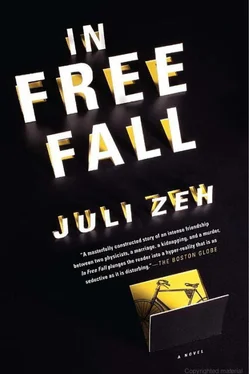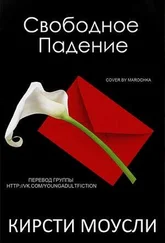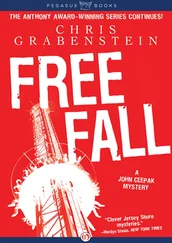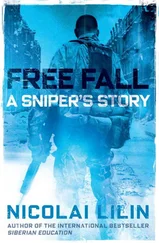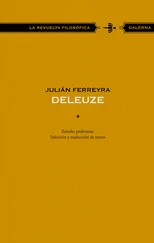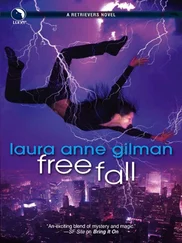When he cranes his neck to look up the mountain, he can already see the bushes lining the road. Two wind turbines murmur in the distance, the placid rotors turning above the forest canopy, looking out over the whole of Freiburg. A group of scouts are whispering their way through the forest, carrying cooking equipment and folding spades on their narrow backs. They gather at the edge of a clearing two hundred kilometers farther east, so Sebastian knows nothing of this.
But as he takes a sip of dead water, out of the corner of his right eye he catches a glimpse of something moving. The ferns are rustling. Something large is coming nearer. Sebastian jumps up. His stretched nerves conjure images of brown bears. Suggestions for an appropriate reaction do not follow. He watches as a figure unfolds in the ferns, but it does not swell into the threatening mass of a bear, only the trim form of a little man. Agewise, he could be Sebastian’s father. His face is hidden in the shadow of a floppy hat, his eyes looking around restlessly from under the brim. It is a while before Sebastian takes in this apparition. The man is festooned with equipment: a large net sticking up over his right shoulder, two cameras dangling from the left, a lantern-shaped cage in the crook of his arm, and a butterfly net in his hand. He purses and stretches his lips constantly, turning his head this way and that, as if he is greeting everything he sees with air kisses. Finally he stretches his arms out, as if he has realized that he was expecting to meet Sebastian here.
“Son!” he cries, rounding the “o.” “Rare to have company at this hour. It’s a good day. Look.”
His Wellingtons wobble around his calves as he approaches, raising his knees as if he were wading through water.
“The best ones are always the most difficult to catch. They like being alone, prefer the shadows at this ungodly hour. And they show the world a mask, or perhaps a second face.”
The butterfly net drops to the ground and the old man holds the lantern-shaped cage in front of Sebastian’s face. Unprompted, Sebastian takes it in both hands. Through the transparent walls a fantastical face grimaces back at him, round eye-whites showing, a broad nose, cheeks with dark shadows on them, and a mouth with pink flews, like the jaws of a predator. Sebastian, who could not have spoken even if he knew what to say, feels as if the hideous face is looking right through him in the most unpleasant way.
“From the family of hawk moths,” says the butterfly catcher, slapping himself on the thigh—not with joy but because of the midges. “ Smerinthus ocellata , a fantastic specimen. Look at this lady’s real face.”
When Sebastian turns the cage, he sees a miniature gas mask: bulging eyes and a trunk, feathery feelers sticking out of the sides like tiny fringes of fern. The hawk moth allows him only a cursory glimpse before it creeps into a corner and folds its wings together, transforming itself into what looks like a piece of bark. Sebastian passes back the cage.
“That’s nature for you,” the butterfly collector says. “A labyrinth of distorted images and trickery. Everyone deceiving everyone else.”
He positions the cage contentedly in the crook of his arm and lifts his equipment. As he is turning to leave, he looks Sebastian in the eye for the first time. “What about you?”
It is only now that Sebastian realizes who is standing before him: the witness who always materializes at the end of a murder case. Instead of panic he feels an impulse to laugh, which he suppresses with difficulty. Murder is one of the few things that he has always been absolutely sure he would never do. The presence of a neutral observer suddenly brings home the absurdity of his behavior with full force, and he realizes that he has not come to terms with the meaning of what he is about to do. “Thou shalt not kill” is not enough to make a clear-cut judgment, and they’ve forgotten to add the list of exceptions to this rule. In any case, he has little time to come up with the answer to a much simpler question.
“Mushrooms,” he says, rubbing his hands on his trousers as if he can rub away the absence of a mushroom knife and a basket as you would dirt. The butterfly collector sizes up his lack of equipment with amusement.
“A little early in the year.”
“That’s probably why I haven’t found any.”
The small man nods, seemingly pleased with this appropriate reply. He swings the hawk moth in the lantern-shaped cage in farewell and walks away. Sebastian shoulders his rucksack and continues his ascent. Soon he can no longer be sure if he has really bumped into the butterfly collector or not. In his exhausted brain, layered memories of the past forty hours and thoughts of the minutes ahead jostle each other. When he closes his eyes, he sees a hawk moth with the face of a cat. Distorted images and trickery, thinks Sebastian.
When he looks toward the direction in which the small man has disappeared, there are birds in the branches everywhere. Sebastian sees them sitting on the ground and swaying in the bushes. The longer he looks, the more numerous they become. Chaffinches, wood pigeons, jays, nuthatches, song thrushes. Sebastian wonders how he knows their names. And if it is possible that they, too, know his name.
HE FINDS HIS BEARINGS AGAIN EASILY once he reaches the road. Even though a dress rehearsal without the lead actor can hardly fulfill its purpose, he had taken things very seriously. He paced the road deliberately, calculated distances, checked lines of sight, and estimated the gradient and curvature of the corner. He examined tree trunks and finished with a walk around the area. At the Holzschlägermatte inn, he cast his mind over his day out with Maike and Dabbelink. There had been a fleet of shiny motorbikes in front of the dilapidated building that day. Swarms of cyclists had crawled up the mountain and raced down it with their tires singing.
He recognizes the right spot immediately. The road abandons the forest at the top of the hollow, and leads into a kilometer-long downward curve before disappearing between the trees again. The quality of the surface allows speeds of at least sixty kilometers an hour. A cyclist entering the twilight under the canopy of leaves immediately after the glare of the sun would be almost blind for the next hundred meters. During his rehearsal, Sebastian had sought out two trees standing on the left and right of the road like gateposts, and cut notches into the bark at a carefully calculated height, notches that he touches now with restless fingers.
A few meters up the slope, he finds a place from which he can watch the road unobserved. Then he sits down on the ground, unpacks his rucksack, pulls on a pair of plastic gloves that he has taken from the first-aid kit in his car, and lays out his tools in the order he has rehearsed. He has been able to plan up to now; he has no control over the next step. Dabbelink is either training early on Tuesday morning or not. If not, Sebastian will come again on Wednesday, Thursday, and so forth, for all eternity. Or, to put it precisely, until he is taken away and put in an asylum or in prison.
The rising sun dapples his shoulders with trembling points of light. The night air caught in the undergrowth cools his forehead and his neck. Despite this, moisture gathers in the fingertips of the plastic gloves, which Sebastian does not dare to take off. His rapid pulse doubles the length of every second. Half an hour passes without anything of note happening. The rustling and crawling between his feet increases. Some ants are sawing a caterpillar to bits, and carrying pale specks to the entrance of their nest. Sebastian enjoys watching the comings and goings of an entire society that hasn’t the slightest interest in the concerns of larger creatures. From the ants’ point of view, Sebastian’s activities must seem just as surreal as the movements of the stars seem to human beings. He would gladly submit his application to join the ants. He would carry out his duties conscientiously and not step out of line. He would be not an unpredictable loner but someone firmly in the middle—a small cog in the system.
Читать дальше
